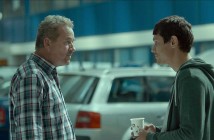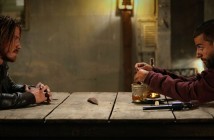
Editor’s Notes: The Lady in the Van is currently out in limited theatrical release.
Playwright and novelist Alan Bennet has found a place in the hearts of millions, thanks to his brilliant skewering of British eccentricity and powerfully touching stories in such great works as Talking Heads, Getting On and the 2012 National Theatre hit People. His witty insights into the idiosyncrasies of modern life have produced some truly excellent screenplays, including Nicholas Hytner’s wonderful adaptation of grammar school comedy-drama The History Boys. Curious, then, that the duo’s supposedly triumphant return, The Lady in the Van, is a profoundly irritating mess with all the wit and nuance of a commercial grade sledgehammer.
. . . a profoundly irritating mess with all the wit and nuance of a commercial grade sledgehammer.
Maggie Smith plays Maggie Smith, this time in the veil of non-flagrant vagrant Mary Shepherd, a hermit who one day parks her titular vehicle-cum-homestead in Bennett’s lawn and refuses to leave for the final 15 years of her life. Inspired by a real episode in the author’s life (portrayed here by Alex Jennings, trading depth or empathy for borderline offensive gay caricature), the aim appears to be a light dramedy in which Smith waxes lyrical about the absurdity of “normal” society whilst Bennett learns of life’s great potential. What we have, however, is a somewhat uncomfortable experience so tonally confused that the majority of dramatic scenes elicit far greater laughs than their allegedly comedic counterparts.

Mary’s incessant objection to almost every single aspect of her life (ranging from the understandable grievance of living arrangements to outright rejection of basic human decency) is about as funny as pouring boiling water into your eyeballs for an excruciating 104 runtime. There’s a rather cynical attempt to fictionalise her backstory in search of any excuse for such despicable contempt towards her relatively understanding peers (especially Bennett himself), one delivered in such a cack-handed, unsubtle way that it borders on self-parody. A horrible, soul-suckingly awful human being in a supporting role can often produce some fine comedy from the bemused reactions of more sympathetic characters, but when they feature in practically every scene, the audience won’t be long to lose all interest in a personality as unapologetically cantankerous as Shepherd’s.
. . . a somewhat uncomfortable experience so tonally confused that the majority of dramatic scenes elicit far greater laughs than their allegedly comedic counterparts.
A germ of an interesting concept is born from dividing Bennett into two separate entities: the meek, weak-willed external self, and the sarcastic, sardonic artistic voice. They converse and debate the morality of exploiting Mary’s situation for his anecdotal work, in turn finding the only moments of emotional truth throughout the pitiful enterprise. Jennings may do a serviceable impression of the literary icon, yet impression is all it really amounts to.
Hytner’s direction, so exuberant and soulful in The History Boys, is invariably unspectacular. Much of the film looks as if it were shot beneath a thick smear of mud; many shots reduced to flat, needlessly ugly images. For a film about embracing life’s pleasures, this is one of the most visually uninspired in quite some time. The atrocious delivery of a major “ascent” is hilariously amateurish, undercutting any thematic resonance in a fell swoop of atrocious CGI.
An astonishingly miscalculated train-wreck, The Lady in the Van wastes a stellar cast and crew with such wilful disdain to easily qualify as one of 2016’s most crushing disappointments.
An astonishingly miscalculated train-wreck, The Lady in the Van wastes a stellar cast and crew with such wilful disdain to easily qualify as one of 2016’s most crushing disappointments.



